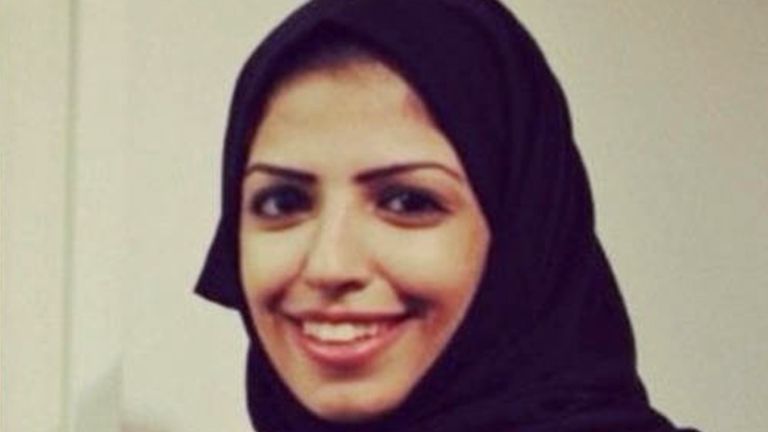Salma al-Shehab: Leeds student jailed in Saudi Arabia is being used 'to set an example' and must be 'immediately released', says Amnesty International
Ms al-Shehab, who was also given a 34-year travel ban, was arrested in January 2021 while on holiday in Saudi Arabia, having been targeted by the authorities for using Twitter to follow, write about and support Saudi women's rights activists.
Thursday 18 August 2022 23:40, UK
A Leeds University student imprisoned in Saudi Arabia for allegedly spreading "false rumours" and retweeting dissidents' posts is being used to "set an example" and must be "immediately released", Amnesty International has said.
Salma al-Shehab was handed a 34-year sentence in a ruling issued under the kingdom's counterterrorism and cybercrime laws on Monday, which the organisation has blasted as a "cruel and unlawful" punishment.
Activists and lawyers consider the sentence against the mother-of-two and activist as shocking even by Saudi standards of justice, and the decision has drawn growing global condemnation.
Amnesty has denounced the "outrageous" decision and called for her to be freed "unconditionally".
The 34-year-old Saudi woman, who is married with two sons aged six and four, had initially been handed a shorter sentence for using the internet to "cause public unrest and destabilise civil and national security".
However, this was increased after an appeals court was asked to consider other alleged crimes.
"Salma al-Shehab should never have been convicted in the first place, but to have her sentence increased from six to 34 years following an unfair trial shows that the authorities intend to use her to set an example amid their unrelenting crackdown on free speech," said Amnesty's Diana Semaan.
"She must be immediately and unconditionally released. The Saudi authorities must allow her to reunite with her family and continue her studies in the UK," she added.
"Saudi Arabia must end its relentless crackdown on women's rights activists and any others who dare to speak their mind freely."
European Saudi Organisation for Human Rights (ESOHR) previously described Ms al-Shehab's sentence as setting a "dangerous precedent for women activists and human rights defenders".
Ms al-Shehab, who was also given a 34-year travel ban, was arrested in January 2021 while on holiday in Saudi Arabia, having been targeted by the authorities for using Twitter to follow, write about and support Saudi women's rights activists, including Loujain al-Hathloul.
Read more: University of Leeds 'deeply concerned' for student sentenced to 34 years in prison
The PhD student was held in prolonged solitary confinement for 285 days before she was brought to trial, which violates international standards and Saudi Arabia's Law of Criminal Procedures, according to Amnesty.
She was also denied access to legal representation throughout her pre-trial detention, including during interrogations, the organisation claimed.
Ms Al-Hathloul was jailed for "spying with foreign parties" and "conspiring against the kingdom", but was conditionally released in 2021.
Ms al-Shehab's sentence, which is so far unacknowledged by the kingdom, comes amid Crown Prince Mohammed bin Salman's crackdown on dissent even as his rule granted women the right to drive and other new freedoms in the ultraconservative Islamic nation.
Since rising to power in 2017, Prince Mohammed has faced criticism over his arrests of those who fail to fall in line, including dissidents and activists but also princes and businessmen.





